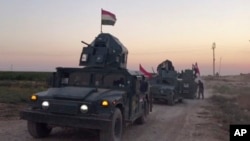Iraq's military said Wednesday its forces recaptured control of more areas from Kurdish fighters, including the Mosul Dam, after carrying out an operation to reclaim the city of Kirkuk and oil fields in the northern part of the country.
The military statement said "security has been restored" in Kirkuk.
Kurds had taken control of the area in 2014 during the chaotic sweep by Islamic State militants through northern and western Iraq. The country's central government demanded the Kurds relinquish control, and acted after Kurdish authorities went through with an independence referendum last month.
The Iraqi forces have faced little resistance, with Kurdish fighters retreating without a fight in most of the areas reclaimed in the past few days.
The two sides have fought alongside each other during the campaign to oust Islamic State from Iraq and each has received military support from the United States.
"Our efforts for the moment is aimed at minimizing potential for additional confrontation, aimed at de-escalating tensions, returning to a sense of normalcy and stability," U.S. State Department Deputy Assistant Secretary for Iraq Joseph Pennington said Tuesday.
State Department spokesperson Heather Nauert told reporters the United States is not taking sides in the tensions between its allies.
"Our advisors are not supporting the government of Iraq, and we're not supporting the Kurdistan Regional Government activities," Nauert said. "We're trying to get the situation calmed as best as possible."
The United States was among those that joined with Iraq in opposing the Kurdish referendum. Iran and Turkey, which each have large Kurdish populations as well, were also against it.
Questioning the goal behind the vote, Iraq’s ambassador to the United States, Fareed Yasseen, told VOA on Tuesday: "The whole idea was to keep our focus on fighting ISIS. This is why all the countries in the world, including the U.S., tried to convince the Kurdish leadership to postpone at the very least, this idea of referendum."
“Who wants war?” Yasseen added, referring to concerns that tensions may escalate into a civil war between Iraqi and Kurdish forces.
A fight for independence
Earlier Tuesday, President of the Kurdistan Region Masoud Barzani said the Kurdish vote for independence "won't be in vain." He also defended his intention to prevent a civil conflict, saying "We never wanted to fight, but fighting has always been imposed on us."
Some analysts said while Iraqi forces are trying to restore their control over disputed territories, Baghdad already has in Kirkuk what it needs to block independence.
"What is needed now is to calm the situation," said Daniel Serwer of the Johns Hopkins School of Advanced International Studies. "Baghdad and Irbil need to be back to the negotiating table, where they can discuss Kurdistan’s relationship with the rest of Iraq."
In a statement, the State Department said it supports a "peaceful exercise of joint administration by the central and regional governments" in all disputed areas.
Pennington told VOA under Iraq’s constitution, the central government has the rights to have a presence in disputed territories, and there is a "constitutional mechanism."
"Obviously before we can get to the details of what that would look like, you need to have a stabilized environment to have those discussions" and to bring people together, added Pennington.
U.S. Army Colonel Ryan Dillon, a spokesman for the U.S.-supported coalition fighting Islamic State, said: "What we have seen is a peaceful handover of areas around Kirkuk. They handed over the keys if you will."
He said that aside from a skirmish south of Kirkuk early Monday that claimed the lives of Iraqi forces and Peshmerga fighters after miscommunications at a Kurdish checkpoint, "there have been no further reports of armed conflict or contact between the two groups."
He said U.S. military commanders are continuing to "monitor the situation, and our leaders, talking with counterparts in both the Iraqi Security Forces and the Peshmerga, urge all sides to avoid escalation. These tensions distract from our unified fight against ISIS, which remains a very real threat here in Iraq."




